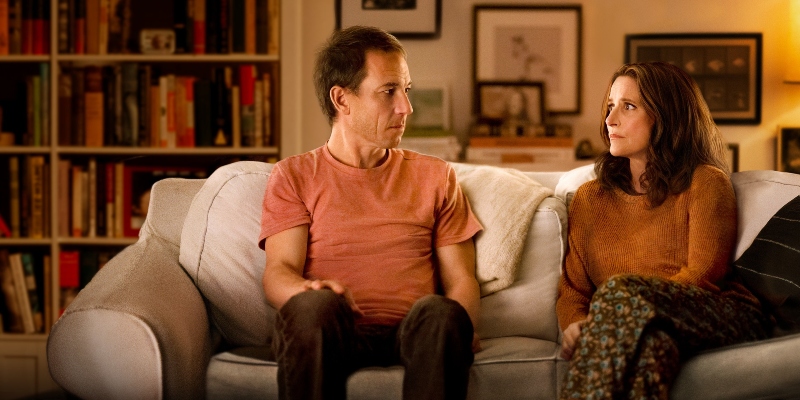You Hurt My Feelings is a Sincere, Satisfying Relationship Comedy
On Nicole Holofcener’s New Film About the Little Lies That Help Us Maintain Loving Relationships
The conceit of writer-director Nicole Holofcener’s new film, You Hurt My Feelings, is perfect. It’s about a writer (Julia Louis-Dreyfus) who, completely by accident, overhears her husband confiding to his brother-in-law that he does not like her new book. He’s been assuring her that it’s great for so long that now he thinks it’s too late for him to say that he doesn’t really get it. He feels awful, now she feels awful. It’s probably the realest premise that I’ve ever seen at the movies.
Holofcener is one of Hollywood’s greatest and comparatively under-sung writer-directors. She got her first Oscar nomination in 2019 for co-writing the screenplay of Can You Ever Forgive Me?, but her oeuvre extends long past that, at least to 1996’s Walking and Talking, a movie about a woman whose anxiety heightens when she learns that her friend has gotten engaged. Holofcener makes movies about women’s experiences—their everyday relationships, anxieties, reflections, frustrations, obligations, and above all, insecurities—knowingly representing these themes with the heavy, dramatic magnitude they often have in real life.
Her films live at this granular level, asking how life not only involves but is also often inevitably defined by little things that happen, or the little things we perceive to be happening. Her films are about the great impact of, say, a snide offhand remark said by a stranger, or a quick glance in the mirror that seems to confirm suspected unattractiveness. Some of her films are unsettling in their representations of what these seemingly mundane factors can wreak (like 2001’s harrowing non-comedy Lovely and Amazing). Others are social satires (like 2013’s true comedy Enough Said). Her subjects are mostly mom-age middle/upper-middle class white women, who sometimes act as mechanisms for her own embedded criticisms of race and class, and sometimes seem to be merely incidental and autofictive beings. All of her films manage to offer existential commentary while also presenting an unvarnished authenticity.
Holofcener is one of the absolute-best dialogue writers in the business, and she is never better than in You Hurt My Feelings, but it’s not just that her characters talk like real people. They think like real people. Films don’t need to be realistic in order to be good, of course, but, like a photorealistic painter, Holofcener manages to stun for how perfectly she does capture real life. More than simply feel “real,” though, there is a truth to her films; her films don’t just suggest “this could happen,” but seem to say “this did happen at some point, maybe even to you.”
You Hurt My Feelings is a relationship comedy with this kind of calibrated hyper-realism. In the movie, Beth (Louis-Dreyfus) grows upset when she learns that her husband, Don (Tobias Menzies), has not told her the truth about his feelings for her new manuscript, a believable premise if there ever were one. The movie asks, though, if Beth is more upset about the fact that he has not been honest with her—or that he doesn’t like her writing. But the film is clear that it’s not so simple; Don explains that it’s not that he doesn’t like the book, but that he doesn’t fully understand it despite having faith that many others will. He explains that his many exhortations, upon his countless rereads, were intended to help her feel focused and good about writing the book she had clearly wanted to write.
Although this tiny, maybe-not-even-a-betrayal is the focal point of the film, it doesn’t dominate the narrative; instead, it becomes a lens through which to view all of the film’s interactions. More than simply argue that to love someone means sometimes lying to them, the film is about how all relationships require occasional little lies. It’s a film about upholding the social contract: participating in a society in which we all know that sometimes what we must do is encourage others when we are secretly skeptical of them, praise others’ accomplishments when we are secretly unexcited by them, promise that everything will be great when we have no idea if it will.
Not only do both Beth and Don overly cheer on their twenty-something son Eliot (Owen Teague, who, shoutout to casting, looks exactly he could be their kid), who is working on a play but has a day job in a weed store, but Beth’s sister Sarah (Michaela Watkins, another win for biologically believable casting), admits to Beth that she tells her actor husband, Mark (Arian Moayed), that he’s good whenever he’s not. And Beth, who teaches writing at the New School, is only ever reassuring when her students announce questionable story ideas in workshop. Everybody lies! Everybody.
But the film has much more to do than simply point this out. You Hurt My Feelings is just as much about not knowing how to provide constructive feedback as it is about copping out and not providing any. Don, a psychologist who has begun phoning it in, can’t help but do more than nod and zone out when his patients talk. Some rather aggressive complainers (Zach Cherry, David Cross, and Amber Tamblyn) are frustrated at him for not figuring out a way to solve their problems, and Don struggles to remember that his job involves figuring out a creative means of offering meaningful critiques and recommendations to those asking for them.
Similarly, Beth, as a teacher, seems to merely nod when her students use workshop time (and their own stories) like personal therapy, working out their own issues via words. It is both of their jobs to actually intervene in their clients’ confessions, and yet they both can’t figure out how to do more than say “good job” and hope those people will work things out on their own.
The kerfuffle between Beth and Don actually teaches them how to become meaningful listeners, confidantes, and guides, not only for each other but for all the people around them. In representing all of this resulting from Beth’s book, the film has a lot to say about what the work of a writer actually is. Beth starts out the film with a memoir already under her belt, secretly wishing that her life had been a little harder so her story would have been more exciting and the memoir would have done better, instead of recognizing that the job of the writer is principally to connect with readers, regardless of how extreme the subject matter might be. She fires her longtime agent Silvia (LaTanya Richardson Jackson) and replaces her with a yes-man because Silvia doesn’t seem impressed by her new book. Beth wants to take the easy way out as a writer, so why is she mad when Don does the same thing by not offering any criticism? Why is she mad when he mirrors her own behavior?
The only way to become a better writer, and write a better book, is to confront things as they are, to interrogate them, to break them apart and to do so messily. Nothing good ever comes from easy work, the film sneakily reminds us: not books, and certainly not relationships.




















